|
Protect The 1st filed an amicus brief today before the federal Ninth Circuit Court of Appeals on behalf of Apache tribes seeking to stop a land swap that would allow Resolution Copper, a foreign mining group, to destroy sacred tribal lands.
The Apache are appealing a ruling by the U.S. District Court for Arizona that found that the land swap, which would allow mining companies to transform sacred Apache lands into a two-mile-wide sinkhole, would not – somehow – amount to a substantial burden of the Apache’s free exercise of religion. Joining with the Jewish Coalition for Religious Liberty, the International Society for Krishna Consciousness, The Church of Jesus Christ of Latter-Day Saints, and the Sikh Coalition, Protect The 1st wrote that the district court misinterpreted the Religious Freedom Restoration Act (RFRA), as well as a precedent, Navajo Nation v. U.S. Forest Serv. “While, on its surface, this case concerns Native American religious rights,” the amici declared, “the district court’s erroneously narrow standard for what qualifies as a substantial burden under RFRA will harm Jewish, Muslim, Sikh, Buddhist, Hare Krishna, Christian and all manner of religious communities, organizations and individuals.” The district court’s findings of fact for the Apache run directly against the court’s ruling. That court recognized that:
Thus, the court ruled that the destruction of a sacred religious site – held in trust by the U.S. government for the Apaches since 1852 – would have a devastating effect on the Apache people’s religious practices … without burdening their exercise of religion. The brief noted that if upheld, this ruling will have a general applicability: “At least the district court’s parsimonious view of substantial burdens does not discriminate among faiths—all will suffer.” The brief assailed the logic of the district court, which did not count the annihilation of Apache sacred land as a “substantial burden” because the government had neither denied a government benefit to nor imposed civil or criminal penalties upon the Apache. In response, the amici write that “the district court ignored that there are other ways, including the governmental plan to have Oak Flat mined into destruction, for religious exercise to be thus burdened.” The brief quotes then-Judge (now Justice) Neil Gorsuch: Whenever the government “prevents the plaintiff from participating in a [religious] activity,” giving the plaintiff no “degree of choice in the matter,” that action “easily” imposes a substantial burden on religious exercise. The amici also criticized the district court’s reliance on a precedent, Navajo Nation, in which the plaintiffs objected to the government’s use of treated wastewater to make snow on a sacred mountain. The court upheld that it did not substantially burden tribe members’ exercise of religion. “But this artificial snow would not physically affect, let alone destroy, the area: As the Court took care to note, ‘no plants, springs, natural resources, shrines with religious significance, or religious ceremonies . . . would be physically affected … no plants would be destroyed or stunted; no springs polluted; no places of worship made inaccessible, or liturgy modified.” The brief noted the vast difference between the application of artificial snow and the complete destruction of a site. In sum, the amici told the Ninth Circuit that the district court ruling misinterprets the clear meaning of the Religious Freedom Restoration Act, as well as Supreme Court and other precedents, and ignores the clear intent of Congress. The San Carlos Apache and other tribes in Arizona won a reprieve of sorts when the U.S. Forest Service, part of the U.S. Department of Agriculture, recently announced it would restart its consultation with the tribes before publishing an environmental review. This review could block or clear a land swap that would result in the destruction of the tribes’ sacred land widely known as Oak Flat in the Tonto National Forest.
Now Arizona Gov. Doug Ducey has intervened, asking the Department of Agriculture to reverse its decision to freeze the land swap, enabling foreign mining interests to mine the land. If the project moves forward, the Apache’s sacred land, where the tribes pray and hold ceremonies, will be transformed into a 2-mile-wide crater. “This case at the very least shows that the Arizona government’s respect for the Religious Freedom Restoration Act is spotty at best in its application to smaller and less politically connected religious minorities,” said Protect The 1st general counsel Gene Schaerr. “If this act, which protects religious freedom as guaranteed by the First Amendment, is trashed for one group, ultimately it can be trashed for all groups.” When a corporate political action committee makes a campaign donation to a candidate or party, it is required to report those donations to the Federal Election Commission. Most would agree that is as it should be. Now the acting chair of the Securities and Exchange Commission proposes to require businesses to disclose their contributions to think tanks, trade groups and other advocacy or public policy organizations that speak out on issues.
Just as Protect The 1st is concerned about individuals being harassed for their speech and contributions, so, too, are we concerned about harassment of businesses that exercise their right to speech. One need only have a passing acquaintance with the news to see how just the threat of boycotts, cancellations, and “doxing” of individual executives could chill the First Amendment rights of businesses. Two decades ago, the executives and their spouses of a medical research company in the United Kingdom were viciously attacked, both in terms of reputation (some were publicly advertised as prostitutes, with their home addresses given out) and physically beaten after being doxed by extreme animal rights activists. The world has not become any kinder since that happened. The SEC proposal is part of a wave of attempts to control or punish speech. H.R. 1, now before the Senate, has some donor reporting requirements that would place organizations at risk of speech-chilling actions by those opposed to their views. The Supreme Court is now reviewing the supposedly confidential donor reporting requirements of the California Attorney General, despite a history of that office suffering massive data breaches. The rationale of the U.S. Supreme Court in protecting the privacy – and thus, safety – of supporters of the NAACP should extend to everyone. Privacy protects speech. If we erode the First Amendment rights of corporate executives, don’t be surprised if we start to see erosion in protections for the rest of us. In principle, the Equality Act – the subject of a Senate Judiciary Committee hearing on Wednesday – should be a welcome final affirmation that LGBTQ Americans enjoy the same civil rights as all Americans. It would amend the 1964 Civil Rights Act to forbid discrimination on the basis of sex, sexual orientation, and gender identity in areas ranging from employment, to credit, to housing.
During the Senate Judiciary Committee hearing, however, witnesses highlighted problematic provisions that could encroach on the First Amendment religious liberties of other Americans in the name of civil rights. The hearing revealed the need to fully codify the rights of LGBTQ Americans in all major dimensions of American life. But it also revealed that the Equality Act would expand the definition of public accommodation under civil rights law to include any church, temple or mosque that provides a social service, from protecting battered women to providing soup kitchens for the homeless. This provision presents a multitude of thorny issues. Would the Equality Act forbid the gender separation of people by sex in the traditional ways practiced by Orthodox Jews and Muslims? Would it require Catholics and evangelical Christians to provide health services that conflict with their pro-life views? After some partisan fireworks, Sen. Thom Tillis (R-NC) ended on a welcome note of potential cooperation with committee Chair Dick Durbin (D-IL). “Even in 2021 our LGBTQ friends and family regularly still face discrimination – from employment, health care, housing, homelessness,” Sen. Tillis said. “This is wrong in any aspect.” Sen. Tillis also noted that there are “serious and legitimate issues” in which “desperate and in some cases competing interests” are unnecessarily pitted against one another by the Equality Act. “Freedom of religion and the free exercise of faith is our most important and sacred Constitutional right,” he said. “It is literally why this nation was founded.” Then he said, “I want to find a compromise that prevents discrimination against anybody in the LGBTQ community, any American. But I also want to protect Americans’ faith … I am afraid that if we don’t get this right, we could on the one hand make progress but create polarization that could create future polarization on this issue.” Chairman Durbin wrapped up the hearing by thanking Sen. Tillis for his suggestion that the two sides work together to find an acceptable compromise. “Wouldn’t it be refreshing if we had a constructive, non-confrontational conversation about our mutual concerns?” We recently reported on the ideological breadth and quality of the coalition of civil liberties organizations filing amicus briefs on behalf of the Americans for Prosperity Foundation and the Thomas More Law Center in a donor privacy case before the U.S. Supreme Court. These petitioners ask the Court to lift the burdensome donor reporting requirements of the California Attorney General’s office, which would easily reveal the identities of nonprofit donors, chilling speech and subjecting these donors to harassment.
Now five additional highly respected organizations have stepped forward to file a joint amicus in Americans for Prosperity v. Becerra. They include:
Here are some of the most relevant excerpts: Speech Chilled by Threat of Government Reprisal and Personal Retaliation “The disclosure law at issue here, at least as it has been implemented by California, risks undermining the freedom to associate for expressive purposes. That freedom, in turn, is fundamental to our democracy, and has long been protected by the First and Fourteenth Amendments. A critical corollary of the freedom to associate is the right to maintain the confidentiality of one’s associations, absent a strong governmental interest in disclosure. If the State could categorically demand disclosure of associational information, the ability of citizens to organize to defend values out of favor with the majority would be seriously diminished. As this Court recognized in NAACP v. Alabama ex rel. Patterson, 357 U.S. 449 (1958), the compelled disclosure of an expressive association’s members or supporters threatens to chill free association, because people may refrain from exercising those freedoms rather than expose themselves to government reprisal or private retaliation.” California’s Disturbing Record “California’s blanket demand for nonprofit organizations’ IRS Form 990 Schedule B documents, which include the names and addresses of major donors, is not designed to facilitate public disclosure; indeed, California is ostensibly committed by law to maintaining the confidentiality of nonprofits’ Schedule B forms. But in light of California’s record of inadvertently publicizing these sensitive documents, its demand should be treated as a de facto public-disclosure requirement, triggering a more stringent form of exacting scrutiny. The record in this case discloses a disturbing pattern of failures to keep the forms confidential. California’s assurances that previous mistakes will not be repeated is unlikely to persuade donors that their information, once handed over to the State, will remain confidential. The resulting chill to First Amendment interests harms donors, nonprofit organizations, and civil society writ large. “The breaches of confidentiality here were massive … ‘[b]y altering the single digit at the end of the URL’ corresponding to each file on the Registry website, Petitioner’s expert witness ‘was able to access, one at a time, all 350,000 of the Registry’s confidential documents.’” No Legitimate Reason for Requirement “California argues that it needs blanket, pre-investigation access to nonprofit organizations’ Schedule B forms in order to ‘polic[e] charitable fraud and self-dealing’ … The District Court did not find this interest especially compelling. Noting that California had not identified ‘even a single, concrete instance in which pre-investigation collection of a Schedule B did anything to advance the Attorney General’s investigative, regulatory or enforcement efforts,’ it found that California’s disclosure requirement ‘demonstrably played no role in advancing the Attorney General’s law enforcement goals for the past ten years.’” In sum, these five respected organizations argue in one eloquent voice that California has no legitimate reason to request donor names and addresses, has a proven track record of disclosing this nonpublic information, and that the result likely has been to chill speech and discourage participatory democracy. An amicus curiae brief filed by Protect The 1st warns the Supreme Court of the physical, monetary and reputational dangers to individuals and the exercise of free speech if the court upholds a requirement by the Attorney General of California to disclose the identities and addresses of donors to nonprofit organizations.
This disclosure demand, enforced by Attorney General Xavier Becerra (now President Biden’s nominee to head the Department of Health and Human Services) against the Thomas More Law Center, a Catholic organization, and Americans for Prosperity, a libertarian nonprofit, is based on a purported need to prevent fraud in charities. The attorney general pledges to keep this information in confidence. Yet in 2009, his office inadvertently mislabeled contributions made by individuals, releasing them on the internet. In one instance, California released the confidential information of hundreds of donors to Planned Parenthood. “California has a checkered history of playing fast and loose with highly sensitive donor information,” said Gene Schaerr, general counsel of Protect the 1st. “Its carelessness has already exposed countless donors to abuse by state actors and by private individuals who may disagree with the donors’ view.” In its brief before the U.S. Supreme Court, Protect The 1st, joined by the Pacific Research Institute, notes the increasing sharp and violent divide between ideological extremes in the United States. The brief asks the court to apply the same logic to this case that it applied to NAACP v. Alabama (1958), which recognized that the release of donor identities would have subjected the NAACP’s donors and members to violent abuse. In NAACP, the court reasoned that the “indispensable liberties” of “speech, press, or association,” make it crucial that possible infringement be closely scrutinized even when the infringement is unintended. Thus, the court held that any legislation that “would have the practical effect ‘of discouraging’ the exercise of constitutionally protected political rights” is a matter of great concern under the First Amendment. In the case now before the Supreme Court, a district court judge in California had ruled in favor of the nonprofit groups. The San Francisco-based 9th U.S. Circuit Court of Appeals in 2018 reversed that decision, prompting the current appeal to the Supreme Court. Protect The 1st’s brief cites many recent examples in which supporters and donors on all political sides have been “doxed,” or had their addresses, social media accounts and phone numbers listed for online and physical mobs to punish them.
“The instances of targeted violence, organized by social media and online technologies, is growing,” Schaerr said. “Given that one judge has said that ‘California’s computerized registry of charitable corporations was shown to be an open door for hackers,’ upholding the California rule would be tantamount to storing gunpowder in a cigar store.” The fate of lands central to the religion of the Apache is once again in grave doubt, as is the scope of the Religious Freedom Restoration Act, meant to protect the First Amendment right to freedom of worship. A public-private land swap approved by Congress in a midnight deal slipped into the Defense appropriations bill in 2014 allows a foreign mining consortium, Resolution Copper, to mine copper in the Tonto National Forest. The mine would seize land long held sacred by the Apache and transform it into a 2-mile-wide crater. The Apache won a conditional victory on Monday when the U.S. Department of Agriculture withdrew an environmental impact statement on the project. On that basis, on Friday the Ninth Circuit Court of Appeals denied the emergency request to stop the Forest Service from handing over the land. The appeal will continue on an expedited basis. “The transfer and destruction of an ancient Apache sacred site clearly violate federal law,” Luke Goodrich, vice president and senior counsel at religious liberty law firm Becket, told journalists. He noted that Oak Flat is central to the Apache religion. “If it is destroyed, there’s nowhere else for them to carry on their sacred tradition.” “The transfer and destruction of an ancient Apache sacred site clearly violate federal law,” says Becket’s Luke Goodrich. Oak Flat is central to the Apache religion. “If it is destroyed, there’s nowhere else for them to carry on their sacred tradition."
“I don’t see how the U.S. government can separate an Indigenous religion compared to Catholic or Mormon or Islam,” said Morgun Frejo, a Navajo who sees the mining of the land as akin to the Notre Dame Cathedral fire. “We all pray to a higher being.” Protect The 1st will remain on alert on ways to help Becket and other allies of the Apache in their appeal. The House of Representatives is on the verge of passing a donor disclosure law that will amplify one of the ugliest realities of our cultural and political moment – the reputational, economic and physical attacks promoted by “doxing.”
This is the practice of posting a target’s personal information online so he or she can be harassed or worse. In December, someone upset over Donald Trump’s loss put up a website posting the private email address, home addresses, and pictures of the homes of the Georgia election officials and employees of a state vendor who had a role in certifying the 2020 presidential election vote totals. In case you didn’t get the point, the website overlaid their photos with a rifle’s crosshairs. In 2018, a congressional intern was arrested after posting the home addresses of several Republican senators during the Brett Kavanaugh hearings. Black Lives Matters reports that white supremacist groups are monitoring their channels on the encrypted Telegram app and posting personal information of BLM volunteers. This practice is particularly effective in punishing donors to politically controversial causes. In 2009, small donors to Proposition 8, a California ballot measure opposing same-sex marriage, received death threats and envelopes containing white powder. Their names and ZIP codes were helpfully overlaid on a Google Map. Concerns about the need for privacy of financial donors extends back to 1958 when the NAACP successfully argued before the U.S. Supreme Court that Alabama had violated its constitutional rights by issuing a subpoena for financial records, including names and addresses of the Association’s members. NAACP v. Alabama became a landmark civil rights decision, with Justice John Marshall Harlan II stating that immunity from state scrutiny is related to the rights of individuals “to pursue their lawful private interests privately and to associate freely with others.” It will soon be back to the future, however, if certain provisions of the For the People Act, HR 1, become law. Buried within HR 1’s 791 pages is a provision that would require any group that spends $10,000 or more to make “public communications” on a range of policy and political issues to disclose donors’ identities. Any group that spends money on online communications, including tweets, in favor of policy issues would be subject to onerous reporting provisions. Ostensibly created to promote financial transparency, HR 1 has the clear potential to chill speech and undermine freedom of association. California state law already requires charitable organizations to disclose their biggest donors to the state. A lawsuit, Americans for Prosperity Foundation v. Xavier Becerra, resulted in a preliminary injunction to bar implementation of that law. The district court ruled in favor of the foundation on the basis of established precedent under NAACP v. Alabama. The U.S. Court of Appeals for the Ninth Circuit reversed the district court’s holding, and the Supreme Court is now reviewing the decision. In New Jersey, the American Civil Liberties Union in 2019 challenged the constitutionality of a law requiring all social welfare organizations to disclose information about their donors. The ACLU sued, saying the law that would enact “vague and overbroad disclosure requirements for organizations that engage in public advocacy work, including even those that do not engage in electoral politics.” An amicus brief in the Supreme Court case submitted by Protect The 1st and the Pacific Research Institute notes that doxing “has evolved from a tool of sophisticated hackers into a mainstream tactic for fighting the current political and culture wars.” Beyond doxing is the real threat that the employers donors work for will be punished by loss of state business. The simple reality of state or federal governments possessing both the power to compel disclosure and to acquire association membership or donor lists en masse would give any politically motivated administration the ability to harass its opponents. With the advent of digital technology, privately disclosed information could be accessed through a breach in computer security or easily released online by an internal leaker. The lower court’s preliminary injunction in the California case was issued on the notion that a plausible breach could lead to threats or actual violence against donors. In today’s hyper-politicized world, where people are “cancelled” every day, it is not difficult to imagine that unintentional exposure of donor or member lists will lead to serious harm. HR 1 is marketed as a bill to repair American democracy. But the disclosure provision will empower both politicians and trolls to chill speech, suppress political disagreement and organize mobs to punish anyone they don’t like. Protect the 1st has filed an amicus brief in the Supreme Court challenging a California requirement that all non-profits disclose the personal information of their donors to the California Attorney General’s Office. Our brief can be found here.
Protect The 1st's brief is one of many filed by a large bipartisan group of nonprofit organizations. Protect The 1st is proud to stand with these organizations that have filed briefs in defense of First Amendment rights in Americans for Prosperity Foundation v. Becerra, as well as in separate cases challenging donor-disclosure requirements across the country. The issue at stake is whether California – and by implication, the federal government – can force nonprofit organizations to disclose private donor lists. California says such requirements are needed to enable greater financial transparency and prevent fraud. In so doing, we argue, California jettisoned established First Amendment cases that have protected the right of donor and member anonymity for decades. Before this case made its way to the Supreme Court, the NAACP Legal Defense and Educational Fund (“LDF”) filed a brief in the 9th Circuit in support of the Americans for Prosperity Foundation. In its brief, the NAACP claimed that California’s donor-disclosure scheme will impose disproportionate harms on the most vulnerable Americans:
The American Civil Liberties Union and ACLU-New Jersey challenged a similar New Jersey law in 2019. In its lawsuit, the ACLU highlighted the law’s “vague and overbroad disclosure requirements” and the impact those requirements would have on “organizations that engage in public advocacy work, including even those that do not engage in electoral politics.” Terence Dougherty, ACLU general counsel, stated “all nonprofits should be able to speak out on urgent issues of the day without a fear of being subject to disclosure rules that go beyond the bounds of what the Constitution allows.” The libertarian-leaning Cato Institute filed an amicus brief recently raising similar concerns and arguing that any law requiring organizations to out their donors should be subject to exacting First Amendment review:
The Chamber of Commerce of the United States of America has also filed an amicus brief in support of the Americans for Prosperity Foundation. As the world’s largest business federation, many Chamber members “prefer to remain anonymous for a variety of reasons, including to protect themselves from being targeted by extremists who hold different views, to avoid further requests for solicitations, or simply because they do not wish to publicize their charitable good deeds.”
In an age in which “doxing” and political violence are increasingly common, groups of all ideological stripes realize that these disclosure laws and regulations threaten to scare off donors and stifle dissent. Protect The 1st is proud to be part of such a diverse coalition of respected defenders of the First Amendment. On Monday morning, as we reported, Protect The 1st filed an amicus curiae brief on behalf of the Apache Stronghold supporting their lawsuit to halt a federal land swap. This swap would have turned the Apache’s sacred lands over to a foreign mining company to extract copper.
Later in the day, the U.S. Forest Service withdrew its final environmental impact statement for the proposed mine in the Tonto National Forest. The government said that since the impact statement, “the Agency and Department have received significant input from collaborators, partners, and the public through a variety of means.” This action pauses the 60-day clock on the swap of private for public land that would have allowed Resolution Copper to have utterly ruined the Apache’s sacred land. Both Resolution and the Forest Service have said that Oak Flat would eventually become a crater nearly two miles in diameter and up to 1,000 feet deep. “The Resolution project will desecrate Chich’il Bildagoteel, also known as Oak Flat, which is the heart of our religious and cultural beliefs,” said Terry Rambler, chairman of the San Carlos Apache Tribe. Apache leaders noted that the government’s move came just hours before the deadline for the government to respond to Apache Stronghold’s emergency appeal. “This is a reprieve for the Apaches and for religious liberty, but it is not yet a victory,” said Gene Schaerr, general counsel of Protect The 1st. “We’ll work closely with counsel for the Apache Stronghold and our religious liberty allies to ride herd on this case and to protect the First Amendment rights of all Americans. Protect the 1st filed an amicus brief today asking the Ninth Circuit Court of Appeals to overturn a ruling by the U.S. District Court in Arizona that would allow Resolution Copper, a foreign mining consortium, to mine copper from land sacred to the Apache – and turn it into a sinkhole.
The district court found that the destruction of the sacred land would not amount to a “substantial burden” under the Religious Freedom Restoration Act (RFRA), which protects the freedom to worship as guaranteed by the First Amendment. Protect the 1st notes in this filing that the district court found the following facts, (emphasis added):
General counsel of Protect the 1st Gene Schaerr noted the irony in the district court’s findings and its ultimate conclusion that they did not amount to a substantial burden on religion: “Somehow, closing off a portal to the Creator is not a substantial burden on the practice of this religion? Imagine telling Catholics, Jews or Muslims, ‘sorry, we’re going to have strip away your right to visit the Vatican, the Wailing Wall or the Al-Aqsa Mosque, and turn it into a sinkhole. But don’t worry, this won’t be a substantial burden on your religious liberty.’” He added: “If allowed to stand, the district court’s ruling would be degrade the religious-liberty rights of all religious Americans. It is also illogical: The court takes conditions that are sufficient to find a substantial burden and then makes them necessary.” Protect the 1st supported the argument of the plaintiffs, the Apache Stronghold, that the district court erred in divining that the standards of RFRA and the Religious Land Use and Institutionalized Persons Act (RLUIPA) – declared by the Supreme Court to be “the same standard” – have “evolved differently.” “The equivalency between these two statutes is settled law,” Schaerr said. The proposed mine was made possible by a last-minute rider slipped into the must-pass Department of Defense budget in 2014 that swaps private land for public land in the Oak Flat parcel of the Tonto National Forest. Protect the 1st noted that a skein of issues, including an 1852 treaty between the United States and the Apache, was largely swept aside by the district court’s ruling. “For the religious liberty of all, we must uphold the religious liberty of a few,” Schaerr said. The brief can be read here. |
Archives
June 2024
Categories
All
|
ABOUT |
ISSUES |
TAKE ACTION |


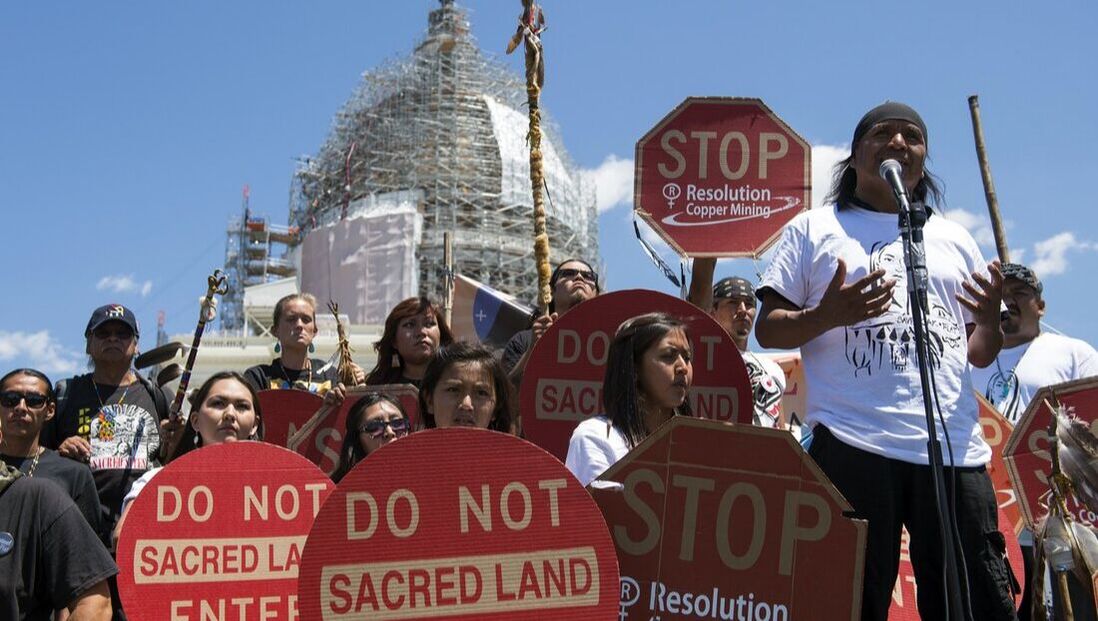
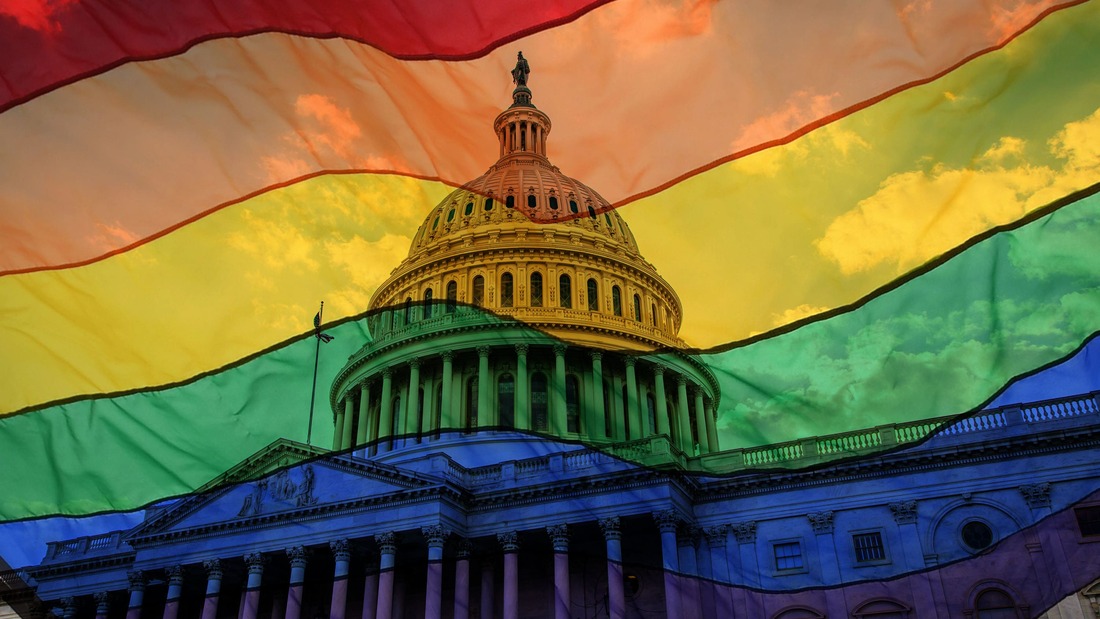
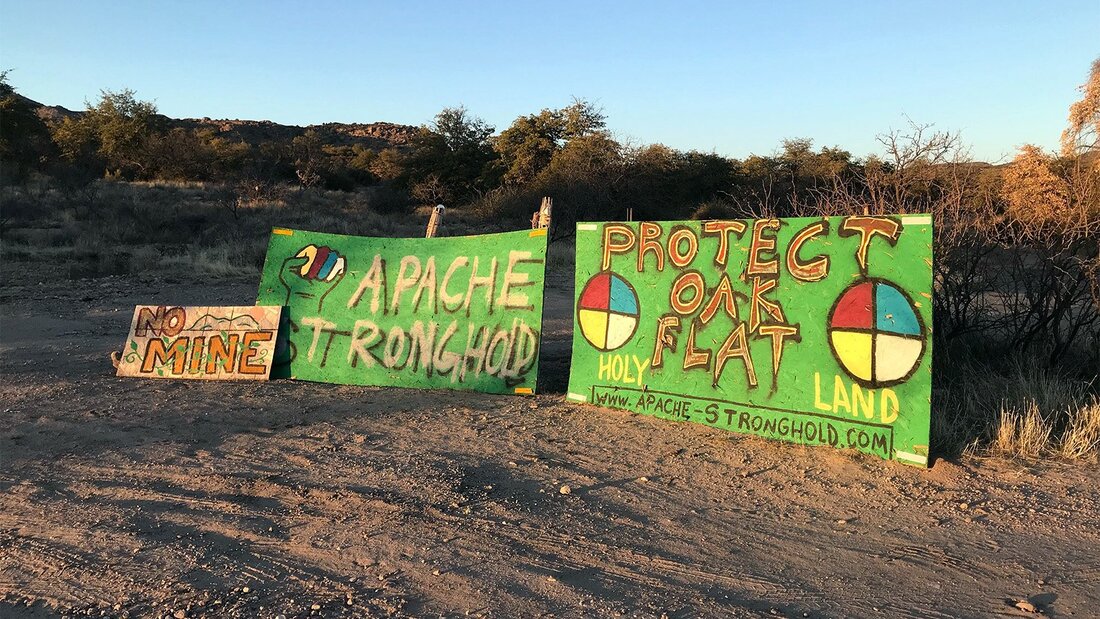

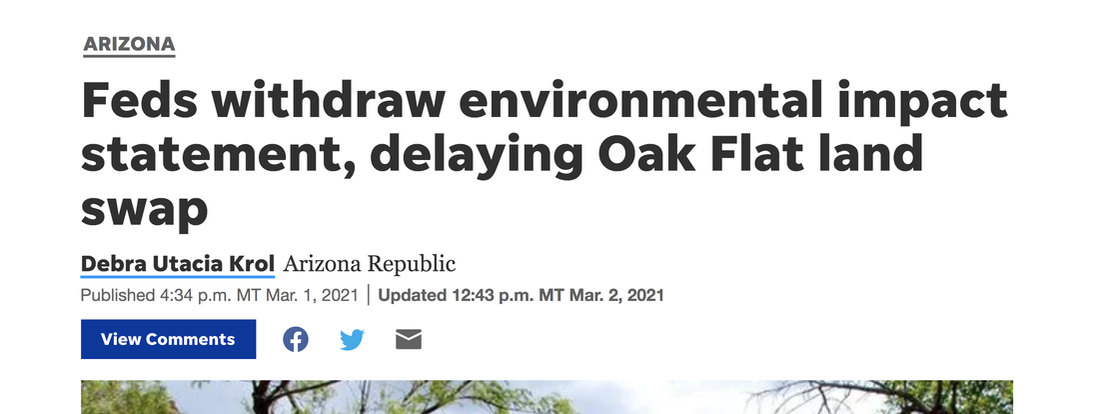
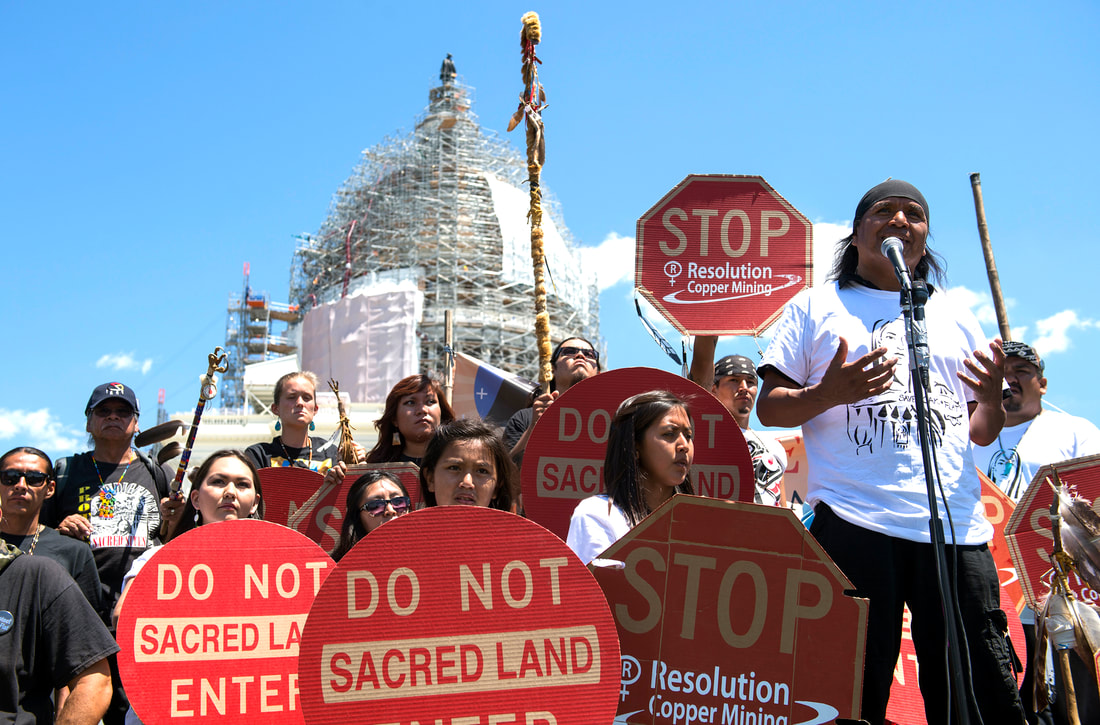
 RSS Feed
RSS Feed